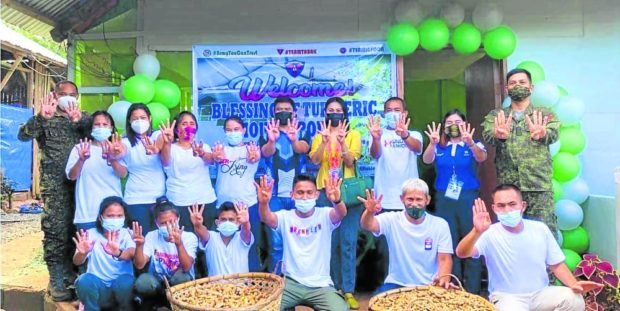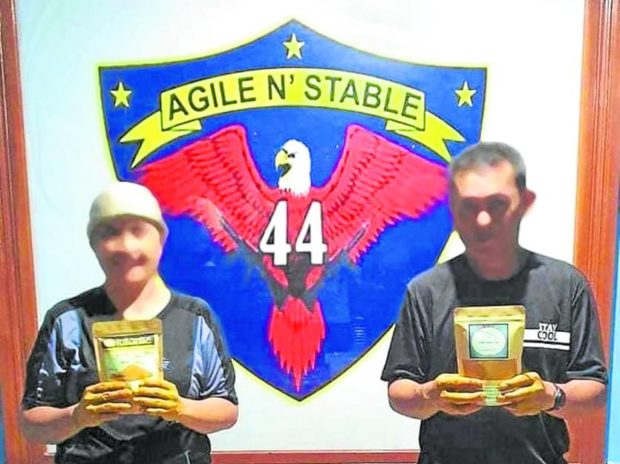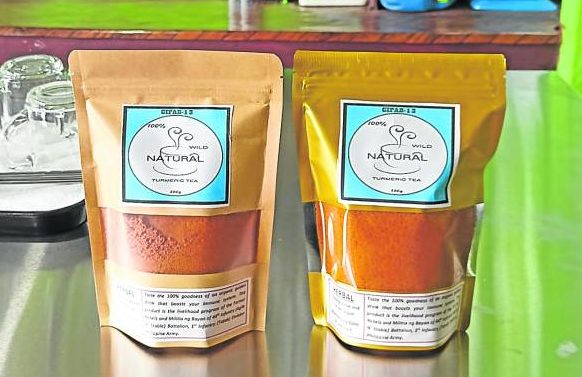In Zamboanga Sibugay, brew comes out of rebel lairs

EXPANSION | Officials of the military and other government agencies join former NPA guerrillas who ventured into turmeric herbal drink production, during the blessing of their facility in Imelda, Zamboanga Sibugay, in August 2021. The venture has graduated from manual to mechanized processing of the product. (Photo from the 44th Infantry Battalion, Philippine Army)
IMELDA, Zamboanga Sibugay, Philippines — Ronnel Racho vividly remembers that while still in the mountains years back, a yellow herbal drink was a regular beverage that helped keep him and other fellow communist guerrillas in tiptop shape as they continued challenging the government, one day at a time.
“It’s like our morning coffee,” Racho said.
The New People’s Army (NPA) fighters in the hinterlands of Zamboanga Peninsula, which once hosted guerrilla strongholds, call it the “rebels’ brew,” a simple concoction of wild turmeric and brown sugar.
“We extract the juice from the turmeric and cook it in slow heat with sugar until it dries like a golden brown powder. We can have it in either liquid or dry forms, but due to our need for constant mobility, we prefer it dry,” Racho told the Inquirer.
Apart from being a morning beverage, the rebels also take the turmeric drink to keep them away from colds, fever, and infections.
Article continues after this advertisementRacho recalls how the brew “eases stress, boosts one’s immunity, and possesses calming effects for better sleep.”
Article continues after this advertisement
GOING MAINSTREAM | Two former NPA fighters present the so-called rebels’ brew, their “secret drink” while in the mountains years ago that is now making inroads in the local wellness market. (Photo from the 44th Infantry Battalion, Philippine Army)
New chapter
Today, with Racho turning his back on the underground communist movement, the rebels’ brew has found its way into the local wellness market, attracting a growing clientele.
For the military, the journey of the seemingly lowly herbal drink from the mountains to society’s mainstream symbolizes a new chapter in the region’s bout with the communist insurgency.
Lt. Col. Filven Noche, commander of the Army’s 44th Infantry Battalion, said the idea for a commercial venture of the brew came rather randomly.
Lt. Col. Don Templonuevo, Noche’s predecessor, noticed that the former rebels were in the habit of drinking what looked like golden yellow tea. This led him to discover the rebels’ brew.
Templonuevo inspired the former guerrillas to start a livelihood out of it, vowing to support them every step of the way.
Cinderella Yursua, known as “Azon,” and Antonio Roda Dialagdon, known as “Don-Don,” both former ranking NPA cadres who surrendered in September 2020, soon came up with a blueprint for the budding enterprise.
By November 2020, around 30 former NPA fighters decided to give the venture a go, with a startup capital of only P40,000 borrowed from Templonuevo.
Labor intensive
They organized themselves into an association called Community Integration Flex A, B, 13 Association (CIFAB-13). The group’s name is short for the name of Western Mindanao guerrilla fronts where they came from like Guerilla Fronts Feliciano A, Feliciano B, Front 13, and Kalaw.
They named the brew CIFAB-13, coming in 250-gram and 500-gram packs and marketed as a choice drink for fighting inflammation, treating arthritis, supporting cardiovascular and cognitive functions, improving skin and respiratory health, managing pain, helping prevent cancer and diabetes, regulating cholesterol levels, promoting gastrointestinal health, and combating depression.
“We started manual grinding of turmeric to extract the juice and manual mixing until ready for packaging. It was labor intensive, but we were able to generate almost P300,000 in income from it,” Racho said.
After settling their loan to Templonuevo, Racho recalled that the association was poised for expanding production. The earnings they retained were supplemented with the incentives they got from the government.
Racho said they initially received a P20,000 cash incentive from the municipal government of Bayog, another P20,000 from the provincial government of Zamboanga del Sur, and P15,000 worth of livelihood package, mostly equipment for their startup business.

HOT DRINK | The rebels’ brew, marketed as CIFAB-13, is also gaining popularity among soldiers. (Photo from the 44th Infantry Battalion, Philippine Army)
Gov’t support
Noche said the former rebels also partnered with the Department of Trade and Industry (DTI) to enhance the marketability of CIFAB-13, as well as with the Department of Science and Technology (DOST) for product development.
With equipment support from DOST, the former rebels can now manufacture CIFAB-13 faster and with scale.
Noche said they were helping the group in the process of licensing their product with DTI and obtaining approval for the drink from the Food and Drug Administration (FDA).
He said marketing activities for the brew had not yet gone full blast pending the FDA certification but the drink could be bought in most army camps in the Zamboanga Peninsula where it is sold on a consignment basis.
The product, Noche said, has a high market promise because of strong demand.
“We are hoping to generate more support by promoting this healthy drink,” he added.
At a strategic level, the military hopes that the commercial success of the former guerrillas’ venture helps close a chapter of the region’s history marked by armed confrontations between government forces and the NPA rebels.
Brig. Gen. Arturo Rojas, acting chief of the Western Mindanao Command, said the NPA in the region is weakened by years of sustained military offensives.
This is the reason why the regional task force on ending local communist armed conflict declared the Zamboanga Peninsula to be “in a state of stable internal peace and security,” according to Police Maj. Shellamae Chang, spokesperson for the regional office.
But the Army hopes the war ends with the transformation of the lives of former combatants into economically productive members of mainstream society.
“And the continuing flourishing of income-generating projects by the rebel returnees in the region is a good indicator of the former rebels adapting to the mainstream,” said Col. John Divinagracia, deputy commander of the Army’s 1st Infantry Division.